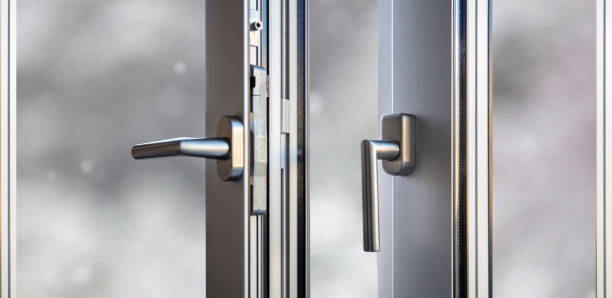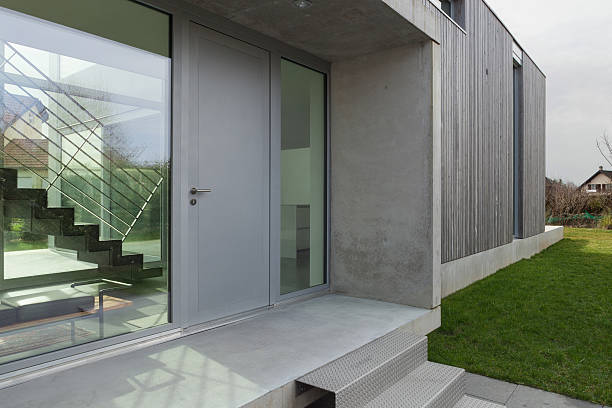

Throughout history, door locks have played a crucial role in providing security and protection for homes and buildings. The evolution of door locking mechanisms can be traced back to ancient civilizations such as Egypt, Mesopotamia, and China.
In ancient Egypt, wooden pins were used to secure doors, while in Mesopotamia, bronze bolts were commonly used. The Chinese developed intricate lock systems made of wood and metal that required keys to unlock. These early forms of door locks laid the foundation for the more sophisticated locking mechanisms we use today.
During the Middle Ages, locksmiths began creating more advanced locks with multiple tumblers that could only be opened with a specific key. This innovation greatly improved security measures and helped prevent unauthorized access to homes and buildings.
The Industrial Revolution brought about mass production of door locks, making them more affordable and accessible to the general public. With advancements in technology, electronic door locks were introduced, offering keyless entry options through keypad codes or remote controls.
Today, modern door locks come in a variety of styles and features to cater to different security needs. From traditional deadbolts to smart locks that can be controlled remotely via smartphone apps, the history of door locks has seen significant advancements in both design and functionality.
Overall, the history of door locks demonstrates how human ingenuity and innovation have continuously improved our ability to protect our properties and loved ones. As we continue to evolve technologically, it will be interesting to see what new developments will arise in the world of door locking mechanisms.
When it comes to securing our homes or businesses, choosing the right door locking mechanism is crucial. There are several types of door locking mechanisms available on the market, each with its own unique features and benefits.
One common type of door locking mechanism is the deadbolt lock. Deadbolts are known for their strength and durability, making them a popular choice for front doors and other entry points. They work by extending a solid metal bolt into the door jamb, providing a strong barrier against forced entry.
Another popular option is the knob or lever lock. These locks are typically found on interior doors and offer a convenient way to open and close doors from both sides. While knob and lever locks may not provide as much security as deadbolts, they are still effective at keeping unwanted visitors out.
For added security, some homeowners choose to install keyless entry systems. These electronic locks use codes or biometric scans to unlock doors, eliminating the need for keys altogether. Keyless entry systems can be convenient and offer advanced features like remote access control.
In addition to these common types of door locking mechanisms, there are also specialty options available such as chain locks, sliding bolts, and magnetic locks. The best type of door locking mechanism will depend on factors such as security needs, budget constraints, and personal preferences.
Ultimately, choosing the right door locking mechanism is essential for protecting your property and ensuring peace of mind. By understanding the different types of door locks available and their respective benefits, you can make an informed decision that meets your specific needs.

A tamper-resistant hinge on a commercial steel door is a crucial component that enhances the security and durability of the door.. These hinges are specifically designed to prevent unauthorized access and tampering, making them an essential feature for businesses and properties where safety and security are top priorities.
The tamper-resistant hinges are constructed with heavy-duty materials such as stainless steel or solid brass, which ensures their strength and resistance to forced entry attempts.
Posted by on 2024-04-16

A heavy-duty deadbolt on a commercial steel door is a crucial security feature that provides enhanced protection for businesses and properties.. These deadbolts are designed to withstand high levels of force and tampering, making them ideal for use in commercial settings where safety and security are top priorities.
One of the key characteristics of a heavy-duty deadbolt is its construction from durable materials such as solid steel or hardened alloy.
Posted by on 2024-04-16
When it comes to door locking mechanisms, traditional lock-and-key systems have been a popular choice for centuries. These systems are known for their reliability and simplicity, making them a common feature in homes, offices, and other buildings.
The functionality of a traditional lock-and-key system is quite straightforward. The key, which is uniquely designed to fit into the lock mechanism, is inserted into the keyhole and turned to either lock or unlock the door. When the key is turned in the correct direction, it engages with the internal components of the lock, such as pins or tumblers, allowing the door to open or close securely.
One of the main components of a traditional lock-and-key system is the cylinder lock. This type of lock contains a cylinder that houses the keyway and tumblers. When the correct key is inserted into the cylinder and turned, it aligns the tumblers at specific heights to allow the locking mechanism to disengage.
Another important component of a traditional lock-and-key system is the strike plate. This metal plate is attached to the door frame and provides added security by reinforcing where the bolt or latch enters when locked.
Overall, traditional lock-and-key systems offer a reliable and effective way to secure doors in various settings. While advancements in technology have introduced electronic locks and smart devices for added convenience and security, many still prefer the simplicity and trustworthiness of traditional lock-and-key systems for their door locking needs.
Advancements in electronic and smart lock technology have revolutionized the way we secure our homes and businesses. Gone are the days of fumbling with keys or worrying about lost or stolen copies. With electronic locks, access is granted through a keypad, fingerprint scanner, or even a smartphone app.
One of the biggest benefits of electronic locks is the ability to control access remotely. This means you can grant entry to guests or service providers without having to be physically present. You can also receive notifications whenever someone enters or leaves your property, providing an added layer of security and peace of mind.
Smart locks take this concept one step further by integrating with home automation systems. This allows you to automate tasks such as locking/unlocking doors at certain times, setting up access codes for specific individuals, and even monitoring who is coming and going in real-time.
In addition to convenience and security, electronic and smart locks are also more resistant to tampering than traditional mechanical locks. Many models come equipped with features such as anti-pick pins, drill-proof housings, and tamper alarms to deter potential intruders.
Overall, advancements in electronic and smart lock technology have greatly improved the way we protect our homes and businesses. As these technologies continue to evolve, we can expect even more innovative features that will further enhance our security needs.
When it comes to securing our homes and businesses, choosing the right door locking mechanism is crucial. There are several different types of door locks available on the market, each with its own unique features and benefits.
One of the most common types of door locks is the traditional key-operated lock. These locks require a physical key to be inserted into the lock cylinder in order to open or close the door. While key-operated locks are reliable and secure, they can be inconvenient if you lose your keys or need to grant access to multiple people.
Another popular type of door lock is the electronic keypad lock. These locks use a numerical code to unlock the door, eliminating the need for physical keys. Electronic keypad locks are convenient and easy to use, but they can be vulnerable to hacking or tampering.
Biometric door locks are another option that have gained popularity in recent years. These locks use fingerprint recognition technology to grant access to authorized users. Biometric door locks offer a high level of security and convenience, but they can be expensive and may not be suitable for all applications.
Ultimately, the best type of door locking mechanism will depend on your specific needs and preferences. It's important to consider factors such as security level, ease of use, and budget when choosing a door lock for your home or business. By comparing different types of door locking mechanisms, you can find the one that best meets your requirements for safety and peace of mind.
When it comes to choosing a door lock, security considerations should be at the top of your list. After all, the main purpose of a lock is to keep unwanted intruders out and protect your home or property.
There are several factors to consider when evaluating the security of a door lock. One important factor is the type of locking mechanism used. Some common types of door locks include deadbolts, knob locks, and smart locks. Deadbolts are generally considered the most secure option as they offer an extra layer of protection against forced entry.
Another consideration is the material and construction of the lock itself. Look for high-quality materials such as steel or brass that are resistant to tampering and corrosion. Additionally, make sure the lock has been tested for durability and reliability.
It's also important to consider how easy it is to pick or bypass the lock. Some locks may be vulnerable to picking or bumping techniques, so look for models that have built-in anti-picking features.
Finally, consider additional security features such as key control and restricted keyways that can help prevent unauthorized duplication of keys.
In conclusion, choosing a secure door lock is essential for protecting your property and ensuring peace of mind. By considering factors such as locking mechanism, materials, durability, and additional security features, you can select a lock that will provide maximum protection for your home or business.